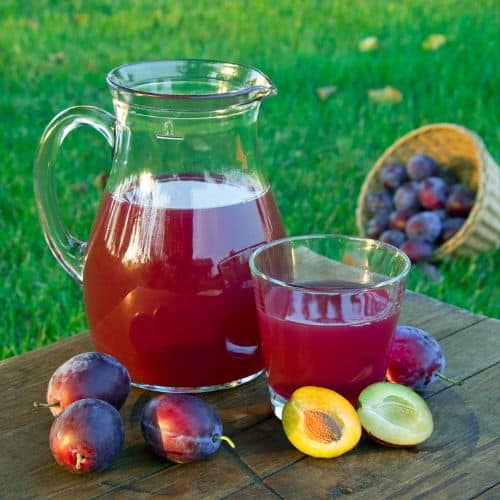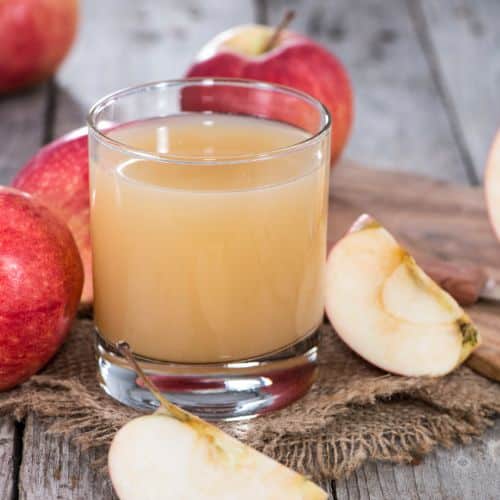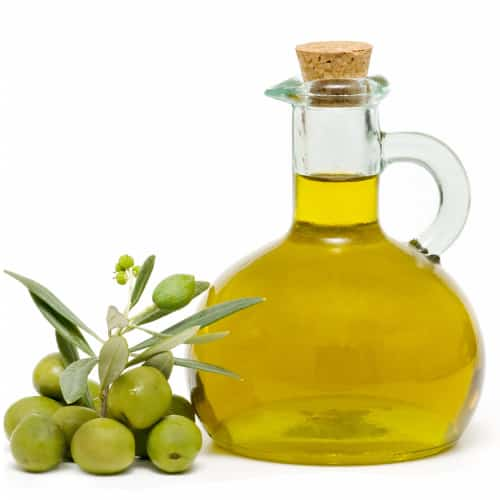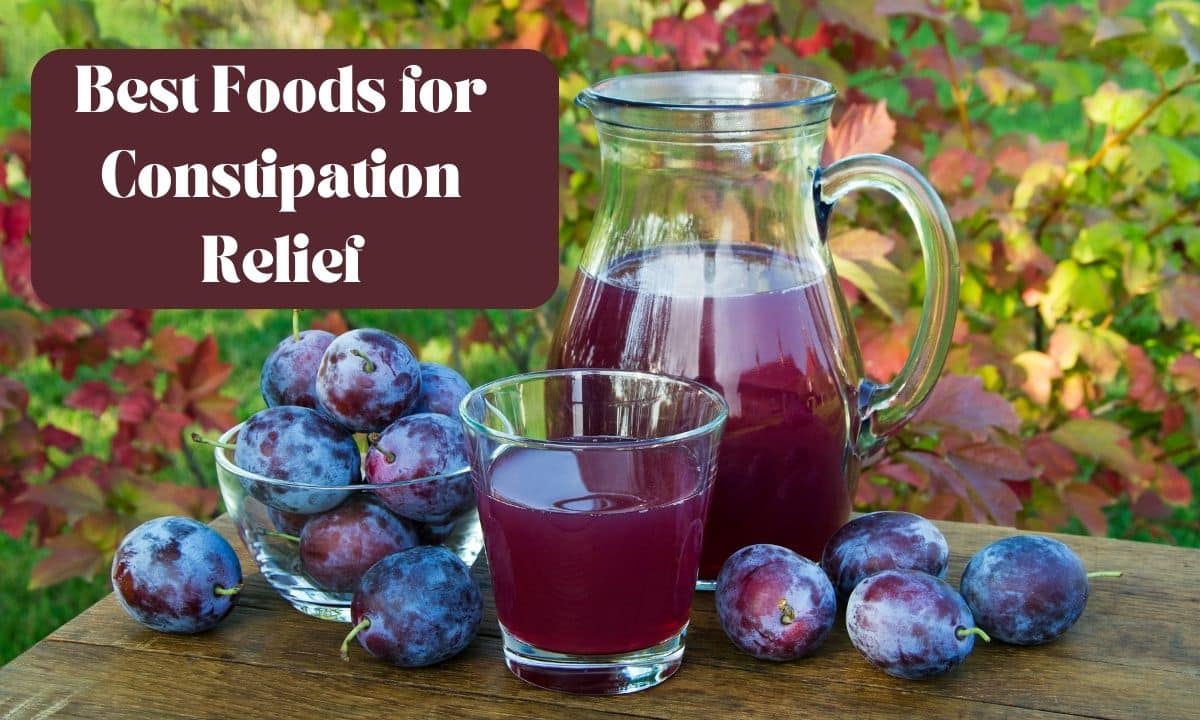Best Foods for Constipation: Unblock the Way
Do you often find yourself in a state of constipation? Eating the right foods can help ease your discomfort and unblock the way.
Table of Contents
ToggleDiscover the secret superheroes of constipation relief! These incredible foods go above and beyond fiber content.
Don’t forget to cover your basics, though—drink enough water, eat enough fiber, and move more.
Prune Juice
Loaded with fiber and sorbitol, prunes are a natural laxative. In fact, prune juice relieves constipation so well that hospitals keep on hand for their patients.

In a recent study, 84 individuals with chronic constipation were recruited. They were defined as having fewer than three bowel movements per week or experiencing hard stools in the past three months.
During the study, participants were asked to drink either one cup of 100% prune juice or a placebo. The results were impressive: after just three weeks, those who drank the prune juice reported a significant reduction in hard stools. After seven weeks, the majority of participants experienced regular bowel movements.
So, if you’re looking for a natural and effective remedy for chronic constipation, consider adding prune juice to your daily routine. It could make all the difference in your comfort and overall well-being.
Eating prunes works too!
Try this recipe: Chocolate Prune Smoothie: It Can Help You Poop
Apple Juice
A kid’s favorite, this juice helps with constipation too.
Apple juice is a very gentle laxative thanks to the high ratio of fructose to glucose.
In addition, the sorbitol in apple juice increases the amount of water absorbed by the intestines, making stools softer and easier to pass.

Apple juice is a very gentle laxative thanks to the high ratio of fructose to glucose. In addition, the sorbitol in apple juice increases the amount of water absorbed by the intestines, making stools softer and easier to pass.
Apples can also help because of their high fiber content.
However, applesauce may not have the same effect on constipation. Why? It contains a large amount of pectin, a substance that can make stool more difficult to pass. So, for optimal results, opt for the juice or whole apple instead.
Pear Juice

Like apple juice, pear juice is another go-to solution for constipation relief due to its high fructose and sorbitol content.
These naturally occurring sugars draw water into the intestines, stimulating bowel movements.
Additionally, pears are a rich source of dietary fiber, which adds bulk to the stool and assists in its smooth passage through the digestive tract. So, sipping on a glass of refreshing pear juice offers hydration and can help regulate your digestive system and alleviate constipation too.
Coffee
Coffee might sound like an odd choice for constipation relief, but believe it or not, drinking a cup of joe can actually help to get things moving again.
Caffeine is a natural stimulant that helps to relax the muscles in the intestinal wall and boost peristalsis (the normal contractions of your intestines). This makes it easier to have a bowel movement.
The temperature of the coffee might also help, as hot beverages improve the movement through the digestive system.

So, if you’re feeling backed up, try drinking a cup of coffee. Just make sure you don’t overdo it, though, because drinking too much coffee can lead to dehydration, which worsens constipation.
Kiwi

Clinical studies have shown that kiwis act as a gentle laxative, relieving discomfort while promoting a healthy gut.
The laxative effects of kiwi might be related to the enzyme actinidin, which helps break down proteins, improves the action of bowel emptying, and stimulates the colon.
Kiwis are also a good source of dietary fiber, which adds bulk to stools and helps them move through the intestines more easily. However, most of the fiber is on the skin, it’s a good idea to eat the whole fruit, including the skin.
Olive Oil
Did you know that olive oil can help with constipation? While it’s not typically thought of as a laxative, it does have a mild laxative effect for some people.
Here’s how it works: when you’re constipated, your stools become hard and dry, making it tough to go to the bathroom. But using olive oil can actually make it easier to pass stools.
The rich fats in olive oil act as a lubricant, making it smoother inside your bowels. Plus, it can help soften the stool by retaining water. So basically, olive oil works just like a stool softener.

And that’s not all! Olive oil is also packed with antioxidants that can help reduce inflammation in the GI tract and improve overall gut health. So why not give it a try and see if it helps with your constipation?
The dose is usually one tablespoon per day. Try it on its own or consider trying a spoonful mixed in with a glass of orange juice or a cup of warm milk.
Read: Why You Should Start Using Olive Oil for Constipation.
Tips to Prevent Constipation
Along with following our tips for food and juices to alleviate constipation, there are a few other steps that you can take.
- Stay hydrated. Drinking plenty of water is essential for healthy digestion.
- Get enough dietary fiber. Whole grains, fruits, vegetables, and legumes are all great sources of fiber.
- Move more. Regular exercise helps to stimulate the digestive system.
The Bottom Line
In brief, the key to effectively managing constipation lies in what you eat and how you live.
Adding fiber-packed foods like whole grains, fruits, and veggies to your daily meals, along with staying hydrated and staying active, can greatly reduce or even resolve constipation.
The use of natural remedies can also provide relief. Note that persistent symptoms should be evaluated by a healthcare professional to ensure optimal digestive health.

Dr. Su-Nui Escobar, a Registered Dietitian/Nutritionist in Miami, FL, is dedicated to empowering women in perimenopause and menopause to live healthier, more satisfying lives.
With a doctorate in clinical nutrition from the University of North Florida, she has expertise in menopause and weight loss, including the unique challenges faced by those on weight loss medications.
Su-Nui’s passion for her field is evident in her previous role as the Academy of Nutrition and Dietetics spokesperson.


